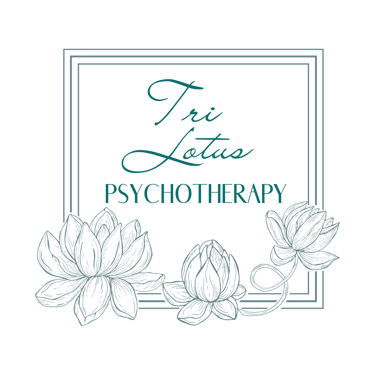NOW ACCEPTING NEW CLIENTS: In-Person in Calgary & Online across Alberta Book a Free 20min Introductory Call! CLIENT LOGIN
From Survival Mode to Thriving: How Self-Care Transforms Our Relationships and Well-Being
This blog post explores the concept of survival mode, a primal state we enter when feeling depleted or overwhelmed, where we perceive others as threats and react out of fear. It explains how natural stress responses like fight, flight, or freeze are helpful in real danger, but become problematic when they persist after the threat has passed, leading to emotional dysregulation. The post emphasizes the importance of self-care, not just as rest, but as a practice of deep nourishment and self-love, which helps shift us from survival mode to thriving. By taking care of ourselves, we create space for compassion and connection, benefiting both ourselves and those around us.
Tri Lotus Psychotherapy
4/29/2025


There’s a place we all slip into when the world becomes too much—when we’re depleted, exhausted, and overwhelmed. It’s a primal state—survival mode. In these moments, everything feels heavy. We tighten our grip on whatever energy we have left, feeling as though we’re barely holding on. And when we’re in this space, it’s not just our well-being that suffers; it’s the people around us too.
The Strain of Survival Mode
In survival mode, everything feels like a threat. Our bodies tense up, hearts race, and our minds become hyper-vigilant. We no longer see others as fellow humans on this journey but rather as potential energy drains—obstacles we need to overcome. The walls go up, not out of self-respect, but out of fear. Fear that the world will take more from us than we can handle. We shut ourselves off, reacting from a place of scarcity, and in doing so, we start to forget that we’re all on the same team.
It’s exhausting to live in constant defense mode. Each interaction feels like another battle to fight, rather than an opportunity to connect. And when we live this way, we lose the magic of life—the moments of quiet compassion, understanding, and collaboration. When we’re in survival mode, we’re not truly living; we’re simply getting by.
The Role of Our Instinctive Responses
It’s essential to remember that fight, flight, or freeze responses are deeply ingrained in us. These natural reactions serve a crucial purpose when we face real, immediate threats. Our bodies go into a heightened state, preparing us to fight, flee, or freeze to protect ourselves. These responses are vital when we’re in actual danger.
However, the real issue arises when these states persist long after the threat has passed. Our bodies and minds remain on high alert, even when there is no immediate danger. This prolonged state distorts our view of the world, making every situation feel like a potential threat. We no longer engage from a place of clarity, but rather react from a place of fear, as if the danger is still looming.
The Consequences of Staying in Survival Mode
When survival mode becomes our default setting, we lose touch with our true selves and our ability to connect meaningfully with others. The longer we stay in this state, the more difficult it becomes to experience the world through a lens of love, compassion, and openness. That’s when the need for self-care becomes non-negotiable.
The Antidote: Self-Inquiry and Self-Care
Self-care isn’t about indulgent bubble baths or facials (though those can be lovely). It’s about deeply nourishing our minds, bodies, and hearts. It’s about checking in with ourselves, honoring our needs, and creating space to replenish. Self-care is about tending to the parts of us that need love, healing, and attention.
When we take the time to care for ourselves in this way, we build a foundation of peace—an inner space where we can stand tall, grounded, and ready to engage with the world from a place of abundance, not scarcity.
The Shift From Survival to Thriving
When we begin to thrive, something shifts. Our energy changes. We no longer react out of fear; instead, we respond from a place of love, patience, and understanding. We begin to see others not as threats, but as fellow travelers on this shared journey. Our relationships become more present and compassionate. Our work becomes more intentional. We approach the world with open arms, rather than defensiveness.
The Ripple Effect of Self-Care
Self-care doesn’t just benefit us—it benefits everyone. When we fill our own cups, we have more to give to others. In a world where so many are struggling, self-care becomes an act of radical love. It becomes a collective force, rippling out and touching everyone we encounter.
Taking Action: A Simple First Step Toward Self-Care
So, the next time you find yourself slipping into survival mode, take a moment. Check in with yourself. Are you in real danger? Scan your environment. Breathe deeply. Recognize what you need, and take a step toward self-care. You don’t have to do it all at once. Start with something small: a quiet moment of stillness, a nourishing meal, or a walk in nature. As you care for yourself, you’ll begin to notice that the world feels less threatening, and your responses to it become more loving.
Self-Care is an Act of Collective Love
Because here’s the truth: self-care isn’t just about you. It’s about all of us. When you take care of yourself, you help create a more compassionate world for everyone.
Let's Connect
Please fill out the form to request an initial appointment
or complimentary introductory call
Contact
hello@trilotustherapy.com
Clinic Hours
Monday: 5:00pm to 8:00pm
Tuesday: 1:00pm to 8:00pm
Wednesday: 8:00am to 8:00pm
Thursday: 8:00am to 8:00pm
Friday: 11:30am to 4:30pm
Saturday: 9:00am to 3:00pm
Copyright © 2025 by Tri Lotus Psychotherapy - All Rights Reserved


Land Acknowledgment: I gratefully acknowledge and honour that where I live, work and play is within the traditional territories of the people of the Treaty 7 region in Southern Alberta, which includes the Blackfoot Confederacy (comprising the Siksika, Piikani, and Kainai First Nations) as well as the Tsuut’ina First Nation, and the Stoney Nakoda (including the Chiniki, Bearspaw, and Wesley First Nations); and Métis Nation of Alberta, Region 3. The traditional Blackfoot name of this place is “Mohkinstsis”, which is also known now as Calgary.

